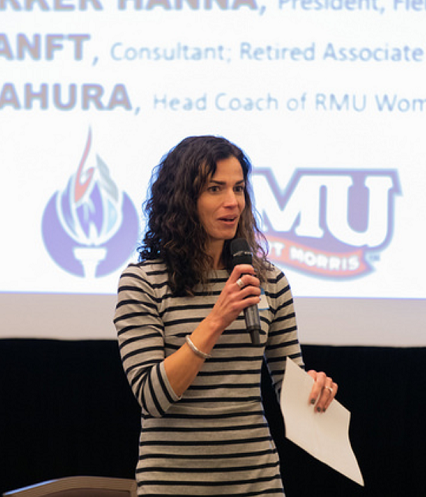Newsroom
Not Keeping Up
TV coverage of women's sports lags behind the actual interest, said panelists at the fourth annual Women in Sport Symposium at RMU.

“Sports commentators should present women’s sports with the same quality and the same value that we see in men’s sports."
Interest in women’s sports is rising, but you would never know it from the media coverage.
That is the conclusion of Cheryl Cooky, who has tracked coverage of women’s athletics over the last 30 years on local TV stations and national shows including ESPN Sportscenter. Cooky presented her research at the fourth annual Girls and Women in Sport Symposium at Robert Morris University on November 8.
“Sports commentators should present women’s sports with the same quality and the same value that we see in men’s sports,” said Cooky, author of the new book No Slam Dunk: Gender, Sport and the Unevenness of Social Change and an associate professor of women’s, gender, and sexuality studies and American studies at Purdue University.
But women’s sports have never received more than 10 percent of televised coverage hours, she said -- and from 1999 to 2014, the share of coverage dropped from 5 percent to just over 3 percent. Announcers also use a different tone for men’s sports, according to Cooky, with more exciting commentary and dominant descriptors such as “He nails it!” or “master of the position,” whereas women’s sports typically are treated with a “just the facts” tone.
“We have more outlets for sports coverage than ever before, and more women participating in sports than ever before. But in the last decade, coverage of women’s sports has actually declined,” said Lauren Rauscher, the symposium’s moderator and the director of RMU Women’s Leadership and Mentorship Program.
Rauscher, an associate professor of sociology at RMU, co-authored a chapter with Cooky in a 2018 research report for the University of Minnesota Tucker Center for Research on Girls and Women in Sport. In it, they discuss the disparities in male and female opportunities for sports and physical activity that starts in early childhood, and how that affects later participation in sport.
Panelists in the symposium talked about their personal experiences in athletics and shared insights about overcoming obstacles to women and girls participating in sports.
“When I feel discouraged, I am motivated by the responsibility to be an example for my team and to help them be successful,” said panelist Nelle Stahura, head coach of Robert Morris women’s rowing.
Other panelists at the symposium included Jodi Butler, owner of the Point Breeze gym Pittsburgh FIT; Kelly Parker Hanna, president of Field of Play Marketing and president of the Pittsburgh chapter of Women In Sports and Events (WISE); Donna Sanft, business consultant and retired associate athletics director and associate dean of students at University of Pittsburgh.
